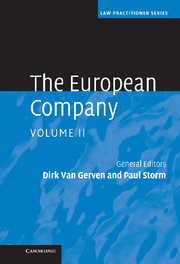14 - Spain
from Part II - Application in each Member State
Published online by Cambridge University Press: 06 July 2010
Summary
Introduction
1. In Spain, Act 19/2005 of 14 November 2005 on the European public limited-liability company domiciled in Spain (‘Ley 19/2005 de 14 de noviembre, sobre la sociedad anónima europea domiciliada en España’, hereinafter the ‘SE Act’) implemented Council Regulation 2157/2001/EC of 8 October 2001 on the Statute for a European Company by inserting an additional chapter in the Public Limited-Liability Companies Act (Ley de Sociedades Anónimas or ‘LSA’) (Arts. 312–338). The SE Act entered into force on 16 November 2005.
2. The Directive has been implemented by means of Law 31/2006 of 18 October 2006 on the participation of employees in European public limited-liability companies and cooperatives (‘Ley 31/2006 de 18 de octubre sobre implicación de los trabajadores en las sociedades anónimas y cooperativas europeas’ hereinafter ‘Law 31/2006). Law 31/2006 entered into force on 20 October 2006.
3. This report focuses on the implementation in Spain of the Regulation and the Directive, highlighting the available options for SEs established in Spain.
Formation
General remarks
Founding parties
4. The SE Act does not contain any specific provisions regarding the requirements to be fulfilled by the founders of an SE; therefore, the rules set forth in the Regulation shall apply in this regard.
5. Spain has enacted the option contained in Article 2(5) of the Regulation. Therefore, a company whose head office is not based in a Member State may participate in the formation of an SE, provided: (i) the company is domiciled in a Member State; and (ii) it has a real and continuous link with the economy of a Member State (Art. 317 LSA).
- Type
- Chapter
- Information
- The European Company , pp. 362 - 390Publisher: Cambridge University PressPrint publication year: 2008



